Prof. Denecke’s undergraduate teaching
BLGY1112 Cell Biology (managed by Prof. Denecke)
This is a new module introduced during the 2007-2008 session intended as a faculty-wide course suitable for degree schemes as diverse as Biology, Microbiology and Biochemistry. The course aims to provide basic conceptual understanding of Cell Biology and Physiology to underpin later studies in applied biology, genetics, biochemistry, microbial, plant and animal physiology and developmental biology. The lecture course will explore the molecules of life, introduce basic energy strategies in micro organisms to higher life forms and discuss the structure and function of cells at the sub-cellular level. The way in which cells containing identical genetic information develop into specialised cell types to form tissues with different functions will be used to introduce the concept of cell polarity and development of multicellular organisms. The scope of the course involves model organisms and special cases, will include plant and animal examples, and aims to provide the foundation for the study of more complex and ethically sensitive organisms (i.e. humans) which are generally not subject to rigorous experimental analysis. The course also aims at illustrating how multidisciplinary approaches will be crucial for the new post genomic research era we are starting to explore, depending not only on classic biology and biochemistry, but also involving mathematics and physics.
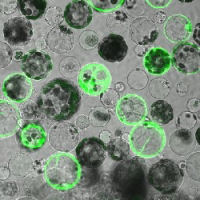 Objectives: Students should gain insight into:
Objectives: Students should gain insight into:
1) The bio-molecules that give rise to cellular structures and how they can be studied experimentally.
2) The cell as a self-replicating unit upon which all higher forms are built.
3) Energy metabolism and adaptive processes to optimise the use of biomass from a cellular perspective
4) The significance of cell compartmentalisation and protein transport to cope with specialised reactions.
5) The introduction to the concept of developmental biology and to appreciate genetic and biochemical approaches involved in its understanding.
6) The extent to which phenotypic variation between cells allows them to adopt specialised roles within a multi cellular organism.
7) The impact basic research has on applied biology including biotechnology.
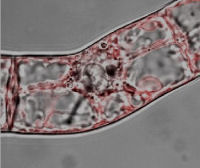 Syllabus: General principles of experimental analysis of bio-molecules will be introduced from a cell biological perspective. Students should obtain an appreciation of how cellular structures support basic metabolism. Since proteins form the primary gene-products and carry out most of the cellular actions, the module focuses strongly on protein synthesis, folding and traffic to different compartments, but Chromosome structure, DNA replication, cell division, mitosis/meiosis and control of gene expression will be illustrated in order to support the genetics module in the second term. The way in which the whole organism maintains itself as a self-replicating unit which can adapt to external signals is one of the keys to survival of the fittest and should be well understood by the end of the course. Specific mention of post-translational modifications and tools in bio-informatics will serve to illustrate emerging tools of the modern cell biologist. A thorough introduction to all major cell compartments will be given. The way in which proteins and lipids can form functional entities and their relevance for the cell will be illustrated. This is followed by an introduction to the cytoskeleton, the concept of cell polarity and cell signaling in order to explain communication of cells within complex organisms and in response to external stresses. Multi cellular organisms will be introduced using plants and animals as examples and students will be introduced to specialised cell types and nutritional and reproductive physiology. The need for multidisciplinary approaches will be highlighted in each of the lectures and links to other modules will be created to explain relevance.
Syllabus: General principles of experimental analysis of bio-molecules will be introduced from a cell biological perspective. Students should obtain an appreciation of how cellular structures support basic metabolism. Since proteins form the primary gene-products and carry out most of the cellular actions, the module focuses strongly on protein synthesis, folding and traffic to different compartments, but Chromosome structure, DNA replication, cell division, mitosis/meiosis and control of gene expression will be illustrated in order to support the genetics module in the second term. The way in which the whole organism maintains itself as a self-replicating unit which can adapt to external signals is one of the keys to survival of the fittest and should be well understood by the end of the course. Specific mention of post-translational modifications and tools in bio-informatics will serve to illustrate emerging tools of the modern cell biologist. A thorough introduction to all major cell compartments will be given. The way in which proteins and lipids can form functional entities and their relevance for the cell will be illustrated. This is followed by an introduction to the cytoskeleton, the concept of cell polarity and cell signaling in order to explain communication of cells within complex organisms and in response to external stresses. Multi cellular organisms will be introduced using plants and animals as examples and students will be introduced to specialised cell types and nutritional and reproductive physiology. The need for multidisciplinary approaches will be highlighted in each of the lectures and links to other modules will be created to explain relevance.
For more details on this course, students are referred to the NBB building, a virtual reality space in which the complete module handbook, the individual lecture slides and exam practice questions can be found. Access only available for University of Leeds students enrolled on this course (Link to NBB site)
BLGY1211 Applied Biology
This course is managed by Henry Greathead and aims to give an overview of Applied Biology with particular emphasis on agriculture, illustrated with specific examples. The course will deal with World Agriculture, the principles of production of crop plants including GM plants, animal nutrition, metabolism and welfare, pests and parasites and their control. Prof. Denecke teaches 11 lectures on this module and covers plant breeding, genetic engineering, various case studies of crop usage and classic biotechnology including various microbial fermentations.
Objectives: At the end of this module the student should:
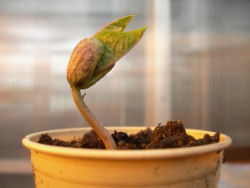 1) be aware of global issues such as international food trade, global warming, desertification;
1) be aware of global issues such as international food trade, global warming, desertification;
2) be able to identify the characteristics of different farming systems, exemplified by those used in Northern Europe and the tropics;
3) understand the factors which affect the growth of crop plants, including climate, fertilisers, disease, and how these problems might be overcome, including by means of genetic engineering.
3) understand the factors which affect the production and welfare of farmed animals, including digestion and nutrition, as well as growth, development and breeding.
4) understand some of the major diseases of animals and how they are controlled.
5) be aware of the current issues in the manipulation of plants and animals to improve productivity, efficiency and quality of agricultural products.
For a basic introduction to the art of recombinant DNA technology click here
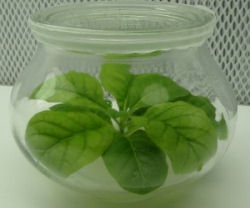 BLGY2162 Plant Biology (managed by Prof. Denecke)
BLGY2162 Plant Biology (managed by Prof. Denecke)
This is a new 20 credit course introduced during the 2006-2007 session to offer a comprehensive introduction to modern plant science aimed at students in all degree schemes and compulsory for Biology students. In the current climate of growing energy prices, plant sciences has never been as important and many job opportunities will emerge in the next decade to explore or to re-discover plants as sources of food, fibre, materials, chemicals and medicines. The aim of this course is to give students a wider understanding of plants as organisms with particular emphasis on processes of growth and development, photosynthesis, nutrition, adaptation to stress, interactions with symbionts and pathogens. The course includes a basic introduction to the genetics, molecular biology and biochemistry of modern plant science. Emerging topics in plant cell biology are to be presented in order to highlight the potential of plants in the sustained production of products ranging from fuels to food and medicine.
Objectives: the course aims to generate
1) An understanding of structure of plant cell walls and their role in plant growth.
2) An understanding of methods and principles to identify, isolate and study plant genes.
3) Knowledge of the mechanisms controlling plant development.
4)
Awareness of experimental strategies to study plant development.
5) An understanding of photosynthesis and the forms of adaptation.
6) An understanding of water balance and mineral nutrition.
7) An understanding of the nature and action of plant hormones.
8) An understanding of the major methods of plant transgene expression and the techniques and model systems currently used in plant molecular biology.
9) An understanding of the major interactions between plants and microorganisms.
10) Introduction to protein targeting and plant cell biology.
11) Appreciation of current opportunities to use plants for sustainable production
The course consists of 50% lectures and 50% practical classes. A central learning objective of the practical classes is to develop skills in experimental plant biology, planning, designing and interpreting experiments and scientific reporting. Assessment of regular practical reports contributes significantly to the overall exam mark.
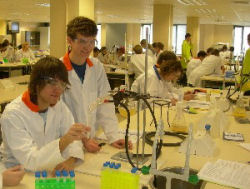 Final year projects:
Final year projects:
40 credit research projects in the Denecke group involve dedicated 1to1 tuition from an experienced lab-member and full integration into the research team. Students will be working on cutting edge questions at the frontier of cell biology research and, depending on ability and dedication, gain a co-authorship on a future research paper. For a list of potential research projects, click here. A list of publications of the Denecke group, click here. 20 credit literature projects are suitable for students who have already decided that they do not wish to carry out practical laboratory work in the future but prefer a job in administration or basic education. For a list of literature review projects, click here.